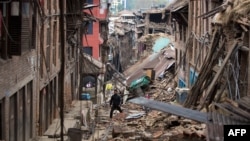Nepal has declared three days of mourning for the victims of Saturday's devastating earthquake that left nearly 5,000 dead and thousands more in desperate need of aid.
In a televised news conference Tuesday, Nepalese Prime Minister Sushil Koirala thanked donors for their assistance, adding that getting help to remote areas remained a major challenge.
The United Nations says the disaster has affected 8 million people with 1.4 million in need of food. The U.N. says it would draw $15 million from its emergency fund for relief operations.
U.N. humanitarian chief Valerie Amos plans to go to Nepal on Thursday to raise visibility of the crisis and assess aid operations.
Officials said Tuesday the death toll had climbed to more than 4,600 people with about 9,000 others injured. They said those numbers could go higher as workers clear more rubble and access more remote areas.
Many people spent another night sleeping outside or in tents with magnitude four and five aftershocks still shaking the region following Saturday's 7.8 magnitude quake.
Challenges
VOA correspondent Steve Herman, who is in Kathmandu, said traveling to the capital city was not a problem Tuesday, but accessing outlying areas remained a challenge.
"The big concern are for villages closer to the epicenter," he said. "There's no way to get to these places by road. The only way to get there is by helicopter, and we're getting reports of villages that, this village had 500 people, another village had a thousand people, and just numerous villages like that that have been flattened."
Reports on Tuesday say around 250 people are feared missing after an avalanche struck the remote village of Ghodatabela, which lies along a popular trekking route near the epicenter of the quake.
Elsewhere, heavy rains are hampering aid trucks from reaching some of the worst-affected areas in the remote part of the country. Helicopters have also been unable to land leaving many stranded and in need of aid.
Health officials warned about the risk of disease with a shortage of clean water and so many people crowded together in the open.
Chaitya Bajrachary, a resident of Kathmandu, was critical of the government's response so far.
"The government is not even giving water to us," Bajrachary said. "I cannot tell you how difficult it was to pass the night. It was such a hard night as we didn't even have water to drink."
Hospitals in Kathmandu have been overwhelmed by the injured.
Damage
Saturday's earthquake struck 80 kilometers northwest of Kathmandu, leveling large parts of the capital's historic center.
Oxfam executive Helen Szoke told VOA the earthquake is a humanitarian and economic "double hit," destroying infrastructure in the tourism dependent country.
Scores of people also were killed in India, Bangladesh, Bhutan and elsewhere along the remote Nepal-Chinese border region.
One source told VOA's Tibetan service that quakes and landslides severely damaged the main highway connecting Tibet to Nepal.
The U.S. State Department on Monday confirmed the deaths of two Americans, Thomas Ely Taplin and Vinh B. Truong, at Mt. Everest base camp.
The International Committee of the Red Cross created a website for friends and family to report missing loved ones, or search for those who have checked in.
VOA's Tibetan and Mandarin services contributed to this report.





